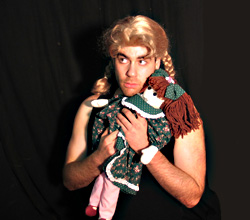Can edge-dwelling theater survive on Capitol Hill when condos cost $800,000 and the loading dock where Empty Space Theatre cadets once smoked nickel bags is now a pizza joint where couples drop $100 on dinner?
Those crowing upstarts at Balagan Theatre say the art has a future, and they are it. In a bare-bones basement beneath spectacular new lofts at 12th and Pike, they’ve launched a new space and season with Cloud 9, a polymorphous-perverse 1979 classic. Its tasty parfait of farce, leftist propaganda, and Victorian satire made playwright Caryl Churchill a star. Though dated, it remains sharp, droll, and, in director Mark Pinkosh’s hands, alive.
Act 1 is liveliest, about a repressed 1880 Brit colonialist family—Clive, Betty, and their kids, Victoria and Edward—invaded by a horny explorer (Jake Groshong), sort of a Rocky Horror who makes house calls. Groshong, a veteran of Balagan’s hit The Transylvanian Clockworks, is a bit stiff, but that’s ideal for a guy who keeps a proper upper lip even while spelunking the undies of all sexes. Lee Morris is smashing as the eminent Victorian Clive, who’s so dashed upright, despite being right up the skirt of the widow Mrs. Saunders (another exemplary ex-Transylvanian, Samara Lerman). During her reluctant orgasm, she admits, “I do like the sensation.”
Best of all is Juniper Berolzheimer, veteran of the New York premiere of another Caryl Churchill play. She leads the cast in precision, which is crucial to nailing Churchill’s pithy style. In Act 1, she rules as Clive’s queenly mother-in-law; in Act 2, she movingly plays his wife, discovering sex in midlife.
The doubling up of performers and parts leads to some confusion as Clive’s wife and kids are played by different actors in the two acts, and women play men and men women. The white Chris Macdonald, who nicely plays Clive’s black servant in Act 1, is then a white gay guy in Act 2. Also, Act 2 is set in a London park 127 years later, yet the carryover characters are only 25 years older.
You do have to pay attention, but it all makes just enough sense, because the characters are only archetypes, and you don’t have to keep track of their relationships. There’s no overall story, just a succession of punchy, disconnected skits about colonialism, sex roles, the politics of the personal. It’s much more fun and intelligible than it sounds in summary. When Clive’s servant, a black man here played by a white, identifies with his patronizing white masters, and whips his more rebellious black countrymen, the ironic point is clear as the waters of Lake Chelan. When he tells Clive’s wife to fetch something herself because she’s got legs under her skirt, we grasp how shocking the very words “legs” and “under your skirt” are to delicate Victorian ears, and how subversive his uppitiness is.
The modern-London scenes are more disconnected than the Victorian spoof, exposing Churchill’s mortal weakness—plotting so casual as to make plot-averse Alan Furst look like plot maestro Alan Ayckbourn. Even so, most scenes score political points with dramatic panache. The playwright heeds the warning of one of her characters: “Don’t turn it into a lecture—it’s meant to be an orgy!” Pleasure takes precedence over preaching, as it should.
Yet Pinkosh’s production has faults to match its ambition. Playing Clive’s wilting Victorian wife in the first act, Ryan Higgins sets his voice amplifier to 11 and his campy quotient to eleventy-seven. Sometimes you have to play it straight, even in drag, and Pinkosh lets him blow it. He also lets Holly Fowers in Act 1 and Groshong in Act 2 ham it up horribly playing children. None of the three sucks at playing other roles, so I blame the director.
The thoughtful, sensitive sound design is brutally murdered by a sound system so excruciatingly crackly I’m amazed it didn’t clear out the theater. There’s no excuse for this in a professional production. If this glitch can’t be fixed, the gizmo should be unplugged. At many moments it ruined the show.
In their remarkably peevish mission statement, the Balaganites claim to be the next big thing in local theater, the antidote to uncommercial shows mounted by idiot egomaniacs they’ve had to put up with in the past. With such a bad attitude, they’d better be good—and they are, on and off. Balagan is a far cry from the epochal excellence of the young Empty Space Theatre, born nearby and recently deceased, but within shouting distance of the achievement of The Group in its infancy. It’s good to know there’s new theater blood, as well as big money, in Capitol Hill’s future.








